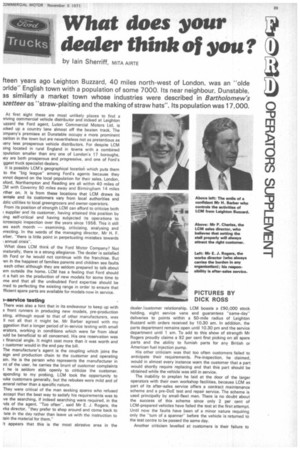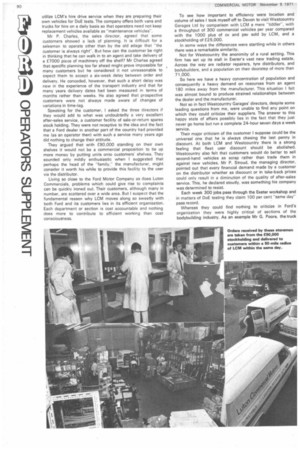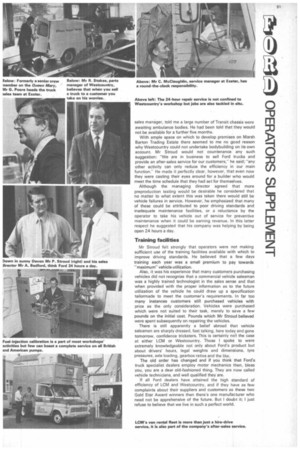What does your dealer think of you? CO
Page 91

Page 92

Page 93

If you've noticed an error in this article please click here to report it so we can fix it.
by lain Sherriff, MITA AIRTE
At first sight these are most unlikely places to find a iriving commercial vehicle distributor and indeed at Leighton uzzard the Ford agent, Luton Commercial Motors Ltd. is icked up a country lane almost off the beaten track. The ompany's premises at Dunstable occupy a more prominent osition in the town but are nevertheless not as pretentious as iany less prosperous vehicle distributors. For despite LCM sing located in rural England in towns with a combined apulation smaller than any one of London's 17 boroughs, ley are both prosperous and progressive, and one of Ford's ggest truck specialist dealers.
It is possibly LCM's geographical location which puts them to the "big league" among Ford's agents because they mnot depend on the local population for their sales. London, xford, Northampton and Reading are all within 40 miles of CM with Coventry 50 miles away and Birmingham 14 miles rther on. It is from these locations that LCM draws its ientele and its customers vary from local authorities and iblic utilities to local greengrocers and owner-operators.
From its position of strength LCM can afford to criticize both ; supplier and its customer, having attained this position by ting self-critical and having subjected its operations to icroscopic inspection over the years since 1956. This it still ies each month — examining, criticizing, analysing and irrecting. In the words of the managing director, Mr H. F. irber, "there is little point in perpetuating mistakes towards
I annual crisis-.
What does LCM think of the Ford Motor Company? Not maturally, there is a strong allegiance. The dealer is satisfied ith Ford or he would not continue with the franchise. But
,en in the happiest of families parents and children see faults each other, although they are seldom prepared to talk about em outside the home. LCM has a feeling that Ford should
it a halt on the production of new models for some time to 'me and that all the undoubted Ford expertise should be rned to perfecting the existing range in order to ensure that fficient spare parts are available for models now in service.
t-service testing
There was also a hint that in its endeavour to keep up with a front runners in producing new models, pre-production sting, although equal to that of other manufacturers, was II not all that it might be. Mr Barber agreed with my ggestion that a longer period of in-service testing with small erators, working in conditions which were far from ideal )uld be beneficial to all concerned. His one reservation was financial angle. It might cost more than it was worth and customer would in the end pay the bill.
The manufacturer's agent is the coupling which joins the sign and production chain to the customer and operating sin. He is the person who represents the manufacturer in nt of the user, he carries the brunt of customer complaints t he is seldom able openly to ctiticize the customer. sponding to my probing, LCM took the opportunity to iuke customers generally, but the rebukes were mild and of ieneral rather than a specific nature.
They were critical of the man seeking spares who refused accept that the best way to satisfy his requirements was to Ate the searching, if indeed searching were required, in the -ids of the agent. "Too often", said Mr E. J. Rogers, the irks director, "they prefer to shop around and come back to late in the day rather than leave us with the instruction to Fain the material for them."
It appears that this is the most abrasive area in the dealer /customer relationship. LCM boasts a £90,000 stock holding, eight service vans and guarantees "same-day" deliveries to points within a 50-mile radius of Leighton Buzzard with orders received by 10.30 am. In addition, the parts department remains open until 10.30 pm and the service department until 1 am. To add to this show of strength Mr Rogers proudly claims a 92 per cent first picking on all spare parts and the ability to furnish parts for any British or American fuel injection pump.
His other criticism was that too often customers failed to anticipate their requirements. Pre-inspection, he claimed, would in almost every instance warn the customer that a part would shortly require replacing and that this part should be obtained while the vehicle was still in service.
The inability to preplan he laid at the door of the larger operators with their own workshop facilities, because LCM as part of its after-sales service offers a contract maintenance scheme and a pre-DoE test and repair service. The scheme is used principally by small-fleet men. There is no doubt about the success of this scheme since only 2 per cent of LCM-prepared vehicles have failed the test at the first attempt. Until now the faults have been of a minor nature requiring only the "turn of a spanner" before the vehicle is returned to the test centre to be passed the same day.
Another criticism levelled at customers is their failure to utilize LCM's hire drive service when they are preparing their own vehicles for DoE tests. The company offers both vans and trucks for hire on a daily basis so that operators need not keep replacement vehicles available as "maintenance vehicles".
Mr P. Charles, the sales director, agreed that some customers showed a lack of planning. It is difficult for a salesman to operate other than by the old adage that "the customer is always right". But how can the customer be right in thinking that he can walk in to an agent and take delivery of a £7000 piece of machinery off the shelf? Mr Charles agreed that specific planning too far ahead might prove impossible for many customers but he considered it not unreasonable to expect them to accept a six-week delay between order and delivery. He conceded, however, that such a short delay was new in the experience of the transport industry and that for many years delivery dates had been measured in terms of months rather than weeks. He also agreed that prospective customers were not always made aware of changes of variations in time-lag.
Speaking for the customer, I asked the three directors if they would add to what was undoubtedly a very excellent after-sales service, a customer facility of sale-or-return spares stock holding. They were not receptive to the idea and the fact that a Ford dealer in another part of the country had provided me (as an operator then) with such a service many years ago did nothing to change their attitude.
They argued that with £90,000 standing on their own shelves it would not be a commercial proposition to tie up more money by putting units onto customers' shelves. They sounded only mildly enthusiastic when I suggested that perhaps the head of the "family," the manufacturer, might consider it worth his while to provide this facility to the user via the distributor.
Living so close to the Ford Motor Company as does Luton Commercials, problems which could give rise to complaints can be quickly ironed out. Their customers, although many in number, are scattered over a wide area. But I suspect that the fundamental reason why LCM moves along so sweetly with both Ford and its customers lies in its efficient organization, Each department or section is cost accountable and nothing does more to contribute to efficient working than cost consciousness. To see how important to efficiency were location and volume of sales I took myself off to Devon to visit Westcountry Garages Ltd by comparison with LCM a mere "tiddler', with a throughput of 300 commercial vehicles per year compared with the 1000 plus of cv and pay sold by LCM, and a stockholding of £25,000.
In some ways the differences were startling while in others there was a remarkable similarity.
Not for Westcountry the anonimity of a rural setting. This firm has set up its stall in Exeter's vast new trading estate. Across the way are radiator repairers, tyre distributors, and bodybuilders, and a population on their doorstep of more than 71,000.
So here we have a heavy concentration of population and consequently a heavy demand on resources from an agent 130 miles away from the manufacturer. This situation I felt was almost bound to produce strained relationships between the dealer and the manufacturer.
Not so in fact Westcountry Garages' directors, despite some leading questions from me, were unable to find any point on which they could criticize their suppliers. The answer to this happy state of affairs possibly lies in the fact that they just never go home but run a complete 24-hour seven days a week service, Their major criticism of the customer I suppose could be the universal one that he is always chasing the last penny in discount. At both LCM and Westcountry there is a strong feeling that fleet user discount should be abolished. Westcountry also felt that customers would do better to sell second-hand vehicles as scrap rather than trade them in against new vehicles. Mr P. Stroud, the managing director, pointed out that every financial demand made by a customer on the distributor whether as discount or in take-back prices could only result in a diminution of the quality of after-sales service. This, he declared stoutly, was something his company was determined to resist.
Each week 300 jobs pass through the Exeter workshop and in matters of DoE testing they claim 100 per cent "same day" pass record.
Whereas they could find nothing to criticize in Ford's organization they were highly critical of sections of the bodybuilding industry. As an example Mr G. Poore, the truck sales manager, told me a large number of Transit chassis were awaiting ambulance bodies, He had been told that they would not be available for a further five months.
With ample space on which to develop premises on Marsh Barton Trading Estate there seemed to me no good reason why Westcountry could not undertake bodybuilding on its own account. Mr Stroud would not countenance any such suggestion: "We are in business to sell Ford trucks and provide an after-sales service for our customers,he said; "any other activity can only reduce the efficiency in our main function." He made it perfectly clear, however, that even now they were casting their eyes around for a builder who would meet the time schedule that they had set for themselves.
Although the managing director agreed that more preproduction testing would be desirable he considered that no matter to what extent this was taken there would still be vehicle failures in service. However. he emphasized that many of these could be attributed to poor driving standards and inadequate maintenance facilities, or a reluctance by the operator to take his vehicle out of service for preventive maintenance when it could be earning revenue. In this latter respect he suggested that his company was helping by being open 24 hours a day.
Training facilities
Mr Stroud felt strongly that operators were not making sufficient use of the training facilities available with which to improve driving standards. He believed that a few days training each year was a small premium to pay towards "maximum" vehicle utilization.
Also, it was his experience that many customers purchasing vehicles did not recognize that a commercial vehicle salesman was a highly trained technologist in the sales sense and that when provided with the proper information as to the future utilization of the vehicle he could draw up a specification tailormade to meet the customer's requirements. In far too many instances customers still purchased vehicles with price as the only consideration. Vehicles were purchased which were not suited to their task, merely to save a few pounds on the initial cost. Pounds which Mr Stroud believed were spent subsequently on repairing the vehicles.
There is still apparently a belief abroad that vehicle salesmen are sharply dressed, fast talking, here today and gone tomorrow, confidence tricksters. This is certainly nol the case at either LCM or Westcountry. Those I spoke to were extremely knowledgeable not only about Ford's product but about drivers' hours, legal weights and dimensions, tyre pressures, axle loading, gearbox ratios and the like.
The old order has changed and if you think that Ford's truck specialist dealers employ motor mechanics then, bless you, you are a dear old-fashioned thing. They are now called vehicle technicians, and well qualified they are.
If all Ford dealers have attained the high standard of efficiency of LCM and Westcountry, and if they have as few complaints about their suppliers and customers as these two Gold Star Award winners then there's one manufacturer who need not be apprehensive of the future. But I doubt it; I just refuse to believe that we live in such a perfect world.




































































































































































